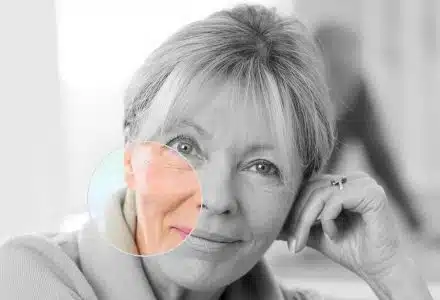The sun is out, and summer is just around the corner! Wearing SPF is widely known to be a non-negotiable factor in your skincare regime – it’s really important to protect your skin against harmful UVA and UVB rays to prevent burning, photoaging and premature ageing of the skin. With so many products on the market with varying ingredients and factors, we thought we’d bust some myths surrounding sunscreens so you can make sure you’re looking after your skin in the right way this summer!

1) You don’t need to wear sunscreen on cloudy days or in the winter
It’s a common myth that you don’t need to wear sun protection on cloudy or rainy days.
However, research shows that even when it’s cloudy, up to 80% of the sun’s radiation reaches the earth. Snow can also reflect 80% of UV rays.
While UVB rays are stronger in the summer (think UVB for Burning), UVA rays that cause ageing and skin cancer, are the same strength all year round (think UVA for Ageing). The truth is that anytime the body is exposed to light from the sun, it is exposed to UV rays.
2) Make up or moisturisers with added SPF are enough skin protection against the sun
While it is true that some make-ups and moisturisers do offer a SPF protection, generally they only contain SPF 15-25 and isn’t applied in enough quantities to provide adequate sun protection. It’s best to layer your products so apply your SPF and then your foundation or opt for a tinted moisturiser.
3) Applying once in the morning is enough for the whole day
Suncreams generally only offer protection for around 90-120 minutes, as the active ingredients can break down after exposure to light, and the oils and sweat on your skin. It’s best to reapply sun protection every 2 hours when in direct sunlight. Also reapply every time after water exposure – even with ‘water resistant’ sunscreen – this doesn’t mean they are completely waterproof as they all eventually wash off! Sunscreens labelled as water resistant are generally effective for around 40-80 minutes of swimming.
4) All sunscreen is the same
There are lots of differences between sunscreens.
- Chemical vs Physical sunscreens – the active ingredients in chemical sunscreens absorb UV rays so they don’t damage your skin. The active ingredients in Physical sunscreens block UV rays. Chemical ingredients can seem into your skin and enter the bloodstream, whereas physical sunscreen ingredients don’t penetrate beyond the outer layer of your skin. Chemical ingredients include oxybenzone, avobenzone and octisalate, whereas physical blockers include ingredients such as zinc oxide, titanium dioxide
- SPF factors – this only indicates the protection factor against UVB rays. Look for a suncream with the term ‘broad-spectrum’ as this indicates that the product protects against both UVB and UVA rays.
- Non-Comedogenic – this means that it won’t block pores, so perfect for acne-prone skin.
- Alcohol-free – alcohol can be drying on the skin, so if you’re looking for a facial sunscreen look for this label!
5) Sunscreen can cause cancer
There isn’t enough scientific evidence to suggest that sunscreen can cause cancer, but more studies do need to be carried out. What we do know is that oxybenzone – a common ingredient in chemical sunscreen – can be found in the bloodstream for up to 21 days after use. However, the FDA reports did not suggest that this was dangerous. If you are concerned, avoid suncreams containing this ingredient. Or opt for a physical sunscreen, rather than a chemical one.
6) Darker skin tones don’t need to wear an SPF
It’s a common myth that darker skin tones don’t need to wear SPF as they have a ‘natural’ skin protection due to higher amounts of melanin in the skin. This commonly held belief can give people a false sense of security as they are less likely to take preventative measures such as wearing a sunscreen, seeking shade and are less likely to routinely check their skin for signs of skin cancer. Although fewer people with darker skin actually get skin cancer, the death rate for dark-skinned people is higher than for lighter-skinned people.
While it is true that higher amounts of melanin in the skin can help to diffuse UVB rays, melanin offers no protection against UVA rays.
Health experts advise everyone should wear sunscreen, regardless of skin colour, or whether you don’t ‘tend to burn’ in the sun. The burn may not be as visible on dark skin, but it does not mean that it is harmless!
7) Having a good base tan means you don’t have to wear an SPF
Getting a base tan in before a holiday or spending the day in the sun does not give any protection from burning or harmful UVA rays. Tanning is essentially your skin cells dying as they produce more melanin to try and combat the damage from the sun’s rays. There is no such thing as a safe tan!
A tan is potential damage to your skin and your body is reacting to sun damage,” said dermatologist Sandra Lee (aka Dr. Pimple Popper). “Your skin can experience sun damage that you cannot see, leading to early signs of aging, hyperpigmentation and potentially skin cancer. That is the dark side of tanning!”
8) Sunscreen will prevent my body from absorbing Vitamin D
Sunlight can penetrate clothing, sunscreens lose effectiveness over time after they are applied, and it’s unlikely that a person will apply sunscreen to every part of their body before being exposed to sun, every single time.
You only need 10-15 minutes of sun exposure a day before your body reaches its maximum production of vitamin D and then stops! The best way to maintain ideal Vitamin D levels is through a healthy and varied diet, supplements and limited sun exposure.
9) Sunscreen doesn’t expire
Sunscreens contain active ingredients that break down over time from production, making it ineffective. The general rule of thumb is that suncreams expire 12 months after opening, but they should all have the date stamped on their packaging. Using an expired suncream may not give you proper skin protection – so always check that date before applying!
Instructions for each sunscreen vary, and people should follow the instructions on the packaging for maximum protection.

When used as directed, sunscreen is proven to:
- Decrease your risk of skin cancers and skin pre-cancers.
- Regular use of SPF 15 sunscreen can reduce your risk of developing squamous cell carcinoma (SCC) by about 40%, and lower your melanoma risk by 50%
- Help prevent premature skin ageing caused by the sun, including wrinkles, sagging and age spots.
Don’t forget – sun damage is cumulative, so even if you don’t see the damage now, you will eventually.


